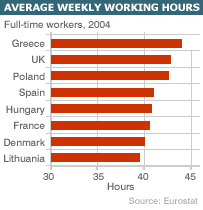Welcome
to Johnbirchall-economist.com!
(Average
working times in some EU countries)

Average
working times in some EU countries
EU employment ministers are meeting on
Tuesday for talks on an EU working hours law, that may weaken a UK opt-out
from the 48-hour maximum working week.
Amendments tabled by the Finnish
government would cut the absolute maximum working week - for people using
the opt-out - from 78 hours to 60.
They would also schedule a review of the
opt-out, with a view to its "gradual ending" at a later date.
States wanting to end the opt-out right
away have never yet had a majority.
On-call time
The European working time directive
guarantees workers at least four weeks' paid annual leave, a minimum
period of 11 hours' rest every 24 hours, at least one day's rest per week,
and a rest break if the working day is longer than six hours.
Working time directive
It also says night workers should work a
maximum of eight hours, on average, in every 24, and entitles them to
health assessments.
The UK has fought moves to end the
opt-out, on the grounds that labour market flexibility promotes economic
growth and lowers unemployment.
Other countries, including France and
Spain, argue that the opt-out is bad for workers' health, and gives the UK
a competitive advantage.
However, most countries face
difficulties complying with a recent European court ruling, which says
that time spent at work on call counts as working time, even when the
worker is asleep.
The amended law, both in the original
form proposed by the European Commission and the form now proposed by
Finland, the current holder of the EU presidency, states clearly that
inactive time on call does not count as working time.
Workers' consent
There have been reports that the UK may
be prepared to accept the Finnish proposal if the absolute maximum working
week is set at 65 or 70 hours, and if there are legal safeguards to
prevent courts overturning the opt-out.
Surrendering
the opt-out would be equivalent to abandoning British businesses but so
would allowing it to be watered down with tons more red tape
.
Under the Finnish proposal, a workers'
48-hour working week could be averaged out over a reference period of up
to 12 months, the precise period being set by national governments.
This would enable most employers
operating in markets where there are seasonal peaks to avoid violations.
The maximum working week of 60 hours,
for those making use of the opt-out, would be averaged over three months.
Workers would have to agree to opt out,
and would be able to withdraw their agreement at any point in the next
three months without suffering any penalty.
The UK Federation of Small Businesses (FSB)
says the Finnish proposal would impose a huge bureaucratic burden on
companies, which would be forced to submit exhaustive records of hours
worked by staff.
UK debate
Fewer workers are now working more than
48 hours - roughly 3.3m instead of 4m eight years ago
Some 1.5m workers would cease working
more than 48 hours per week if their working hours were averaged over 12
months
Up to one million "autonomous
workers" such as senior managers are exempt from the restriction
anyway
"This means that only 800,000 to 1m
UK employees would have to make a serious change to their working
patterns," the TUC said.